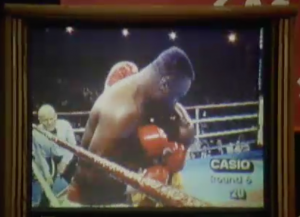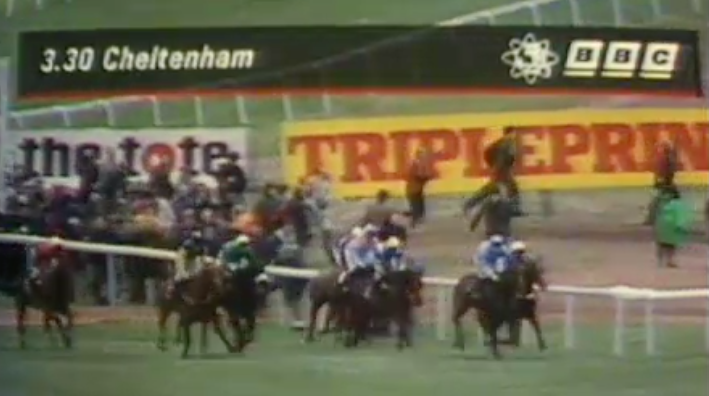by Richard Haynes, University of Stirling
Introduction
The idea that intrinsic meaning and value can be found in sport, which are unique to the human experience, is the driving force of the BBC Arena documentary Sportswriter produced by Francis Hanly, which was written and presented by the acclaimed Observer and Sunday Times sport journalist Hugh McIlvanney. The documentary sets about the task of bringing to light the craft of the sports journalist by visiting three major events: a world title fight in Las Vegas; an England football international; and the Cheltenham Gold Cup. His journeys are both reflection of his own approach to writing about the three sports – boxing, football and horse racing – as well as an investigation of his contemporaries in the press box who he interviews in and around these events. Like many Arena documentaries, the programme provides an esoteric encounter with producers of popular culture, in this case sport journalists (Walker, 1993).
Sportswriter is a televisual essay on the craft of sport journalism, balancing a narrative style which is both artifice and evidence (Corner, 1996). This balancing act is played out in McIlvanney’s approach which includes inward reflection and investigation of other journalists’ practices and values. McIlvanney joins the ritualistic beat of the “press pack” at the three sporting events, which affords him the opportunity to reflect on the ethical and creative challenges he faces every time he sits down to write about sport, as well as meet and talk with his contemporaries in the UK and the United States.
Filmed in 1992, viewing the programme three decades later reveals much about how both sport and journalism have changed in the era of global, digitally-networked sports coverage. The mediatization of sport (Frandsen, 2021) has transformed the culture of sport since the period captured in the documentary, not least the speed of communications. Today’s gatekeepers of sport are not journalists but the publicists and communication managers of elite sport, who are the hidden persuaders of how the public gains access to its stars and their athletic achievements. Layer on top the noise of social media, and the voice of the sport journalist is increasingly lost among a din of inane opinion.
No proper job for a grown person
Sportswriter begins with McIlvanney receiving the award for the British Sports Writer of the Year, an award he won on seven occasions, more than any of his contemporaries. McIlvanney introspectively reflects on the role of the sports journalist in the opening to his narrative. It reveals some inner conflicts he himself felt on the role of the “fan with a typewriter”, a moniker often thrown at a very insular profession. Remarking on his life in sports journalism he says:
After more than thirty years of writing on sport it is still possible to be assailed by doubts about whether it really is a proper job for a grown person. But I console myself with the thought that it is easier to find a kind of truth in sport than it is, for example, in the activities covered by political or economic journalists. Sports truth may be simplistic but it’s not negligible.
The self-mocking concern about his chosen profession does point McIlvanney to suggest there is value in the pursuit of a “truth in sport”, which in turn prompts him to qualify his statement:
Of course, it is important to maintain perspective, to keep a sense of the wider world beyond the touchline or the ring ropes. If you were to ask me which would have been a greater deprivation - to go through life without having read Lear or without seeing the great Brazilian team of 1970 - then Pele would have to yield to Shakespeare. But I’m glad it was never a case of “either/or”.
The grain of McIlvanney’s voice, a rich Ayrshire burr, infused a precise narrative style, layered with subtext, as compelling as it was distinctive. His point about sport was that it revealed much about the human condition, in spite of its surface triviality. His visual essay on sportswriting therefore takes us on a journey to investigate how three different sports inspire the words of the contemporary sport journalists he most admired.
The Fight
As a sport, boxing both compels and repulses. For McIlvanney, this remained a constant tension, as he struggled to justify his fascination for the cruellest of live dramas. For Arena, he was at Caesars Palace in Las Vegas for the Heavyweight Championship bout between Evander Holyfield and Larry Homes, the epitome of modern boxing’s high stakes and high rollers. It was not expected to be a very contentious affair, but it made it no less difficult to write about the sport in which the motive is to render the opponent unconscious.
For McIlvanney, the US produced the best sports writers in the English language of the Twentieth Century: Red Smith and J.J. Leibling among them. He met some of his American peers who he explained “were talented guardians of an impressive tradition”. The chat, both in the Caesars Palace press centre, hotel lounge and bar, focused on what motivated sport journalists to take up the profession. The answers focused on the freedom sports writers had to express themselves compared to news journalists, which was considered more creative to write and more enjoyable to read. In spite of the difference with hard news, William Nack, of Sports Illustrated, argued that sports writing in America was something people took seriously. “I think the reason that I like to write about sports”, Nack remarked, “is that I like to write about human drama, I like to write about people changing, I like to write about people under pressure, I like to read about people achieving and excelling, because there is an inherent drama in that.”
In this sense, sport journalists are prisms that refract the drama of combat through their writing, to make sense of the world boxers inhabit, and why it is of significance. This perspective on why sports writing is of value reflects broader notions of how sport is a form of drama and ritual (Birrell, 1981). It is for this reason, McIlvanney explains, that some of America’s great modern writers also took to writing about pugilism: Ernest Hemmingway, Budd Schulberg, Irwin Shaw and Norman Mailer all wrote important works on boxing.

Arena: Sportswriter (Dir: Francis Hanly, BBC2, 18th July 1992)
Footage from the fight is edited in a montage with past greats from the sport, such as Muhammad Ali versus George Forman in “The Rumble in the Jungle” from 1974, with the effect of collapsing past and present glory in the ring. The fight itself was glib and unremarkable. Not easy for the sportswriter to file their copy from scraps in the early hours from their solitary hotel room. The section concludes with McIlvanney asking whether journalists find the process of writing enjoyable or painful. Hack responds: “It’s like a toothache. Sitting down and writing something is like this enormous extraction. It is draining. It is something I don’t look forward to. But when I sit down at the desk and make a start and get into it, it’s like almost overcoming the fear of the unknown.” Such philosophical reflections give the craft of sportswriting a sense of pathos for those who have a finite time to capture the happenings of a live event.
The Match
McIlvanney came from the coalmining region of Ayrshire, which fashioned some of the greats of football management: Matt Busby, Bill Shankly and Jock Stein. He would later write and narrate an Arena trilogy on the three men called Busby, Stein and Shankly: The Football Men (BBC 2, 1997) which enabled a much longer form visual essay on the influence of industrial Scotland on these great men of British football. The groundwork for those documentaries was formed in Sportswriter, where he suggests the three Scots “were big enough figures to strengthen the sense of community from those they sprang from. They epitomised the intensity that makes football an area of British life where objectivity is almost a heresy.”
His assignment here, was an international friendly, England versus Brazil from Wembley Stadium. The sequence begins with clips of the Brazilian World Cup winning side of 1970, interspersed with images of England’s victory in 1966. The achievements of both nations are replayed in archive footage, again in a montage mixing images of street football in the favelas of Rio de Janeiro and the terraced streets of industrial northern England. The inference, football is the global game.
There is a sense the sixties framed McIlvanney’s sense of what football greatness was and meant. McIlvanney cites the seminal book on the sport from the sixties The Football Man (1967) written by the playwright Arthur Hopcraft. His subsequent interview with Hopcraft muses on a passage in the book which posits football’s “sudden withdrawal from the people would bring deeper disconsolation than to deprive them of television” (Hopcraft, 1967). McIlvanney wryly suggests, in the 1990s, the loss of television would by default deprive people of football too.
The conversation with Hopcraft leads McIlvanney to compare the role of football journalists with the theatre critic, and whether critical judgment is possible within the game. He asks two renown figures of football journalism of the 70s, 80s and 90s, Ken Jones and David Lacey, if a sport journalist can remain distant from the world of sport they are covering. Jones suggests not, because football journalists of the era travelled and lived alongside players and managers, building strong bonds born of a unique professional kinship. Lacey, however, does suggest he tries to keep a critical distance, but both felt players of the late-twentieth century were more sensitive to critique, not least because players or managers never felt the press were expert enough to pass judgment on their profession.
Placing this discussion in the context of the twenty-first century of mediatized sport one might surmise that the distance between players and journalists has become a chasm, at least in traditional press journalism. At the elite level of football getting close to players and managers on the team bus or in the hotel bar are long gone, with players cossetted by agents and communications professionals who act as gatekeepers to the inner sanctum of the game. Sportswriter, and the football journalists it represented, was produced at a period when change was about to sweep through the game, agents were beginning to influence media relations, which would further be exacerbated by the excesses of the Premier League, also launched in 1992.
McIlvanney notes that critical judgement of football is often lost when a journalist has a stake in the game, usually of national patriotism. “When Scotland are involved” he notes, “I find it difficult to be philosophical.” The analogy of fans with typewriters is not so easy to shake on such occasions. The section ends with a montage of the great Brazilian side of 1970 to a samba rhythm, a metaphor that on occasion a sportswriter can only marvel at the aesthetic beauty footballers can perform with their feet.
The Race
McIlvanney’s roots in Ayrshire also played a significant role in his interest in horse racing. “Racing and betting used to be part of the working-class experience in that era”, he once told The Racing Post (Muscat, 2017). In Sportswriter he begins his third and final case study in sport journalism by announcing he always viewed the racecourse as a “suspension of everyday reality” replaced by a “highly theatrical version”. There is also something about our human history with horses that makes the sport compelling, and in the UK this also comes with some class divisions too.

Arena: Sportswriter (Dir: Francis Hanly, BBC2, 18th July 1992)
For the documentary McIlvanney is at the Cheltenham Festival, always held in March and including one of jump racings ultimate prizes The Gold Cup. Here he interviews the biggest names in racing journalism, Brough Scott and Peter O’Sullevan. The big challenge in this game is for the journalist to advise, or ‘tip’, those who bet on racing. O’Sullevan observes that racing correspondents have to be prepared to be wrong on a daily basis, but that credibility comes from writing from the perspective of a ‘punter’ willing to bet their own money, albeit with more insider knowledge of form and conditions.
As the documentary explores, how they gain knowledge about ‘the game’ is fraught with tension. Trainers and jockeys find journalists a nuisance, as one of them remarks, “they want to know all about your business, but pay none of the bills”. McIlvanney’s interviewees suggest there is a lot of bland coverage of the sport, partly because the key information is handled by the Press Association, and also because of a heavy reliance on unremarkable quotes from trainers, owners and jockeys. Brough argues fewer writers rely on their own observation and interpretation of events, something McIlvanney himself brought to racing journalism.
The final part of the documentary focuses on the sentimentality for horses, which suggests that to truly understand the race game you have to be part of it, part of the community that lives and breathes horses, probably comes from the country and has a strong sense of animals. This closed perspective on ‘horse people’ is tangibly real, but it avoids the vast industry that underpins it based on gambling, television and the punters who spend their hard cash on the sport. The final images of the documentary are made of a montage of famous Gold Cup winners all captured by BBC Television, which cements their place in racing history. McIlvanney concludes that for the 1992 Gold Cup, “Carvel’s Hill’s failure in the Gold Cup won’t stay as fresh in the memory as the triumphs of Desert Orchid, Dawn Run and the most brilliant steeplechaser I ever saw, Arkle. But Cheltenham, as ever, had its moments. This year it wasn’t magnificent, but I can never see it as entirely trivial”.
Sportswriter, and the football trilogy that followed, stand as documentary broadcast evidence of Hugh McIlvanney being a magnificent wordsmith. He socialized with writers and critics beyond sport (his younger brother William was a poet and novelist), which brought him in to wider literary circles and friendships. This arguably inspired his approach and thought processes in writing about sport. Perhaps because of it, he is the only sport journalist to be voted British Journalist of the Year. His standing in sport also received recognition among an elite group of journalists inducted into the International Boxing Hall of Fame and the Scottish Football Hall of Fame. His programmes for the BBC’s Arena series stand testament to the belief that sport journalism helps us understand the meaning and significance of sport in our lives, which is neither trivial nor to be downgraded among other forms of journalism.
About the Author
Richard Haynes is Professor of Media Sport and Associate Dean of Research in the Faculty of Arts and Humanities, University of Stirling. He is author of the award-winning book BBC Sport in Black and White (Palgrave, 2016) which provides a history of the formative decades of the BBC Television’s coverage of sport. He is currently researching the use of sporting heritage for healthy ageing and writing a monograph with Raymond Boyle on the relationship between Formula 1 and the media.
Bibliography
(1) Birrell, S. (1981). Sport as Ritual: Interpretations from Durkheim to Goffman. Social Forces. 60 (2), p. 354–376.
(2) Corner, J. (1996). The art of record: A critical introduction to documentary. Manchester: MUP.
(3) Frandsen, K. (2021) Sport and Mediatization. London: Routledge.
(4) Muscat, J. (2017). An absorbing Racing Post interview with the incomparable Hugh McIlvanney. The Racing Post, 1 January 2017.
(5) Walker, J. (1993). Arts TV. London: Libbey.
